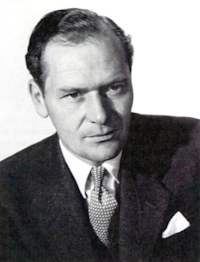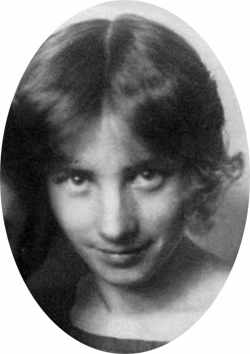
Edward Benjamin Britten, Baron Britten was an English composer, conductor, and pianist. He was a central figure of 20th-century British music, with a range of works including opera, other vocal music, orchestral and chamber pieces. His best-known works include the opera Peter Grimes (1945), the War Requiem (1962) and the orchestral showpiece The Young Person's Guide to the Orchestra (1945).

Sir Peter Neville Luard Pears was an English tenor. His career was closely associated with the composer Benjamin Britten, his personal and professional partner for nearly forty years.

Imogen Clare Holst was a British composer, arranger, conductor, teacher, musicologist, and festival administrator. The only child of the composer Gustav Holst, she is particularly known for her educational work at Dartington Hall in the 1940s, and for her 20 years as joint artistic director of the Aldeburgh Festival. In addition to composing music, she wrote composer biographies, much educational material, and several books on the life and works of her father.
Colin Matthews, OBE is an English composer of contemporary classical music. Noted for his large-scale orchestral compositions, Matthews is also a prolific arranger of other composer's music, including works by Berlioz, Britten, Dowland, Mahler, Purcell and Schubert. Other arrangements include orchestrations of all Debussy's 24 Préludes, both books of Debussy's Images, and two movements—Oiseaux tristes and La vallée des cloches—from Ravel's Miroirs. Having received a doctorate from University of Sussex on the works of Mahler, from 1964–1975 Matthews worked with his brother David Matthews and musicologist Deryck Cooke on completing a performance version of Mahler's Tenth Symphony.
Wise Music Group is a global music publisher, with headquarters in Berners Street, London. In February 2020, Wise Music Group changed its name from The Music Sales Group.

Noye's Fludde is a one-act opera by the British composer Benjamin Britten, intended primarily for amateur performers, particularly children. First performed on 18 June 1958 at that year's Aldeburgh Festival, it is based on the 15th-century Chester "mystery" or "miracle" play which recounts the Old Testament story of Noah's Ark. Britten specified that the opera should be staged in churches or large halls, not in a theatre.
The English Opera Group was a small company of British musicians formed in 1947 by the composer Benjamin Britten for the purpose of presenting his and other, primarily British, composers' operatic works. The group later expanded to present larger-scale works, and was renamed the English Music Theatre Company. The organisation produced its last opera and ceased to run in 1980.
Boosey & Hawkes is a British music publisher, purported to be the largest specialist classical music publisher in the world. Until 2003, it was also a major manufacturer of brass, string and woodwind musical instruments.

James Muir Mathieson, OBE was a British musician whose career was spent mainly as the musical director for British film studios.
Donald Charles Peter Mitchell CBE was a British writer on music, particularly known for his books on Gustav Mahler and Benjamin Britten and for the book The Language of Modern Music, published in 1963.
A Birthday Hansel, Op. 92, is a song cycle for 'high voice' and harp composed by Benjamin Britten and set to texts by Robert Burns. The last song cycle that Britten wrote, it was composed in honour of the Queen Mother's 75th birthday, at the request of her daughter, Elizabeth II.

Sophie Adele Wyss was a Swiss soprano who made her career as a concert singer and broadcaster in the UK. She was noted for her performances of French works, many of them new to Britain, for giving the world premieres of Benjamin Britten's orchestral song cycles Our Hunting Fathers (1936) and Les Illuminations (1940), and for encouraging other composers to set English and French texts. Among those who wrote for her were Lennox Berkeley, Arnold Cooke, Roberto Gerhard, Elizabeth Maconchy, Peter Racine Fricker, Alan Rawsthorne and Mátyás Seiber.
This is a summary of 1943 in music in the United Kingdom.
This is a summary of 1937 in music in the United Kingdom.

String Quartet No. 3 in G major, Op. 94, by English composer Benjamin Britten was his last completed major work, and his last completed instrumental work. It was written in October – November 1975 during his final illness: the first four movements at his home, The Red House, Aldeburgh, and the fifth during his last visit to Venice, at Hotel Danieli. It was dedicated to the musicologist Hans Keller. In December 1975, brothers Colin and David Matthews performed it privately for the composer in a piano duet arrangement. During September 1976, Britten worked on it with the Amadeus Quartet; who premiered it on 19 December 1976 at The Maltings, Snape, two weeks after the composer's death.
String Quartet in D major by English composer Benjamin Britten was written in 1931. He revised it during his final illness, and it was first published in 1974.

Children's Crusade, Op. 82, subtitled a Ballad for children's voices and orchestra is a composition by Benjamin Britten. He completed it in 1969, setting Bertolt Brecht's poem Kinderkreuzzug 1939 for children's choir with some solo parts, keyboard instruments and an array of percussion, to be performed mainly by children. It was first performed in an English version at St Paul's Cathedral in London on 19 May 1969.

Canticle V: The Death of Saint Narcissus, Op. 89, is a 1974 composition for tenor and harp by Benjamin Britten, the last part of his series of five Canticles. Britten set a poem by T. S. Eliot, beginning "Come under the shadow of this gray rock", published in Early Youth. He wrote it in memory of his friend William Plomer. The work was premiered by Peter Pears and Osian Ellis at Schloss Elmau in Upper Bavaria on 15 January 1975. It was published the following year. The canticle was often recorded, including by the first performers.

An American Overture, Op. 27 is an orchestral composition by Benjamin Britten. It was composed in 1941, while Britten and his life partner, the tenor Peter Pears, lived in the United States. Personal difficulties, global events, and the desire to earn more money goaded Britten to leave England and pursue a career in the United States.

The Tema "Sacher" is a composition for solo cello by Benjamin Britten. He composed it between December 1975 and January 1976. It resulted from a request by the cellist Mstislav Rostropovich, who sought to assemble a collaborative musical work from various composers to commemorate the seventieth birthday of the music patron Paul Sacher. Rostropovich premiered the work at the Tonhalle in Zurich, Switzerland, on May 2, 1976. It was the last of Britten's works to be premiered in his lifetime.







